High-Speed Voltage Buffer, SMA Feedthrough
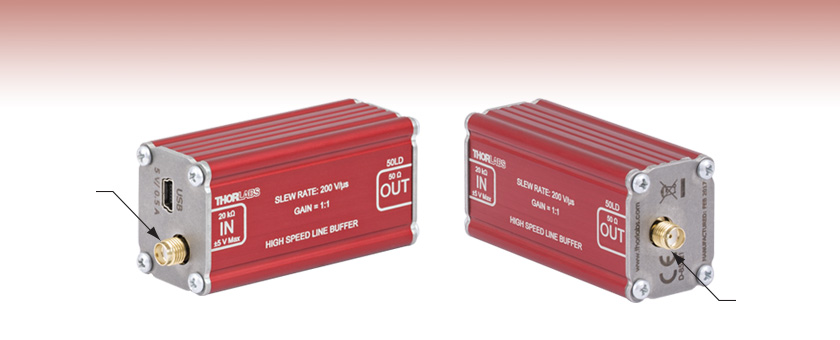
- Drive a 50 Ω Load with a High-Impedance Source
- ±5 V Input with 1:1 Voltage Gain
- 200 V/µs Slew Rate
- SMA Input/Output Connectors
50LD
Input SMA
20 kΩ Impedance
(for Hi-Z Input)
Output SMA
50 Ω Impedance
View Showing Input Panel
View Showing Output Panel

Please Wait
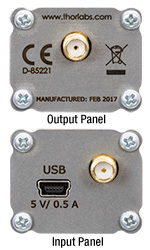
Click to Enlarge
50LD Input and Ouput Panels
| Electrical Components Selection Guide |
|---|
| Low-Pass Electrical Filters |
| High-Pass Electrical Filters |
| DC Block and Mains Hum Electrical Filters |
| Voltage Buffer |
Features
- 20 kΩ Input Impedance and 50 Ω Output Impedance
- Drive High-Speed Analog or Digital Signals up to 200 V/µs
- 20 MHz Bandwidth with SMA Input/Output Connectors
- ±5 V Input with 1:1 Voltage Gain
- USB Mini B Connector for Powering Unit (Cable Included)
- Compact In-Line Housing
Thorlabs' High-Speed Voltage Buffer increases the available current for a low-impedance load that is being driven by a high-impedance source, while maintaining a 1:1 voltage gain through the system. The buffer has a 20 kΩ input impedance and a 50 Ω output impedance. This makes it ideal when trying to modulate a laser source, such as our 4-channel laser source, with a high-impedance controller, such as NI's PCIe-6321 and PCIe-6363 data acquisition boards.
With a slew rate of 200 V/µs, the buffer can drive a fast analog or digital signal with minimal distortion of the input waveform, as shown in the performance plots below. It accepts an input voltage up to ±5 V and is powered using a side-located USB mini B connector. A USB Mini B to Male A cable is included with the device.
The 50LD buffer is an in-line device that features a box design with two female SMA connectors, allowing it to be easily used between two SMA cables. Due to the larger size of this box, 2.51" x 1.25" x 1.00", it is not recommended that this buffer be attached directly to a load or control device. As shown in the images above, the box is engraved with the part number, input voltage range, input/output impedance values, voltage gain, and slew rate.
| Posted Comments: | |
MJ Mir
(posted 2023-03-09 09:54:46.407) How much is the input bias current? Thanks. jgreschler
(posted 2023-03-10 01:51:41.0) Thank you for reaching out to Thorlabs. Additional specs and data can be requested by contacting techsupport@thorlabs.com. I have reached out to you directly to discuss this application. James Cooper
(posted 2023-02-24 14:39:24.367) Are the input and outputs DC coupled or AC coupled?
Thanks ksosnowski
(posted 2023-03-02 12:01:03.0) Thanks for reaching out to Thorlabs. The 50LD input is DC coupled up to 20MHz of analog bandwidth. Mikael Malmström
(posted 2021-12-02 15:46:02.987) What hoppens If the device gets no 5V power supply? Could I use a 5V on/off signal to turn the output on/off YLohia
(posted 2021-12-23 12:16:11.0) Since this device is essentially a Op amp with an amplification of 1, it will only work when the voltage is appropriately supplied. However, we would not encourage you to use the power supply to turn on or off the signal. The device is intended to pass high speed signals, rather than be turned on/off rapidly to pass/not pass the signal. Alexander Sludds
(posted 2021-11-02 09:36:00.06) Please give output/input voltage noise of this device on the page. cdolbashian
(posted 2021-11-08 04:57:28.0) Thank you for reaching out to us at Thorlabs with this feedback! We don't have this data readily available, but I have informed the appropriate dev team of your desire to have this information visible. Ollie Ogunlade
(posted 2021-05-27 10:51:45.48) Hi, do you have the data on the noise specification (maybe as noise referred to input) for the buffer? I would be grateful if you could send it to me, so I can determine if it is suitable for my application. cdolbashian
(posted 2021-06-14 05:07:24.0) Thank you for reaching out to us here at Thorlabs. While we do not have this data right now, we intend to characterize this parameter in the future. Thank you for your feedback! melanie Holmes
(posted 2020-06-09 11:12:05.043) If we drove this with a 10 V power supply would the input range increase to +/- 10 V ?
(Or would it just damage the device( YLohia
(posted 2020-06-09 02:44:50.0) Thank you for contacting Thorlabs. We specify a maximum input voltage of +/- 5 V. Going over this spec risks damage to the device. |

| Specifications | |
|---|---|
| Performance | |
| Source Impedance | 20 kΩ |
| Load Impedance | 50 Ω |
| Maximum Input Voltage | ±5 V |
| Maximum Output Current | 300 mA |
| Slew Ratea | 200 V/µs |
| Voltage Gain | 1:1 |
| Bandwidth | 20 MHz |
| General | |
| Input/Output Connectors | Female SMA |
| Device Input Power | USB (5 V, 500 mA) |
| Operating Temperature | 5 to 35 °C |

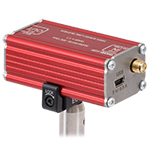
Click to Enlarge
50LD Mounted Using an ECM125 on a Ø1/2" Post
Aluminum Clamps, Post Mountable
These anodized aluminum clamps provide secure mounting for 50LD Electrical Buffer sold above. The ECM100 fits onto the 1.00" side, while the ECM125 fits onto the 1.25" side. The clamp can snap onto the side of the buffer housing and the flexure lock can be tightened using the 2 mm (5/64") hex locking screw on the side.
Each clamp has a #8 (M4) counterbore on the bottom. The counterbore allows the clamp to be mounted on a Ø1/2" post or any surface with an 8-32 (M4) tap. The clamp must be mounted via the counterbore before the buffer housing is attached, as the counterbore will not be accessible once the housing is secured in the clamp.
Plastic Clamp, Double Sided
The EPS125 clamp can attach to the 1.25" side of the 50LD Electrical Buffer sold above. Two electrical buffers can be mounted to a single clamp for a secure and compact setup.
 Products Home
Products Home










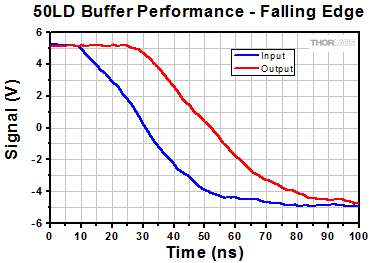
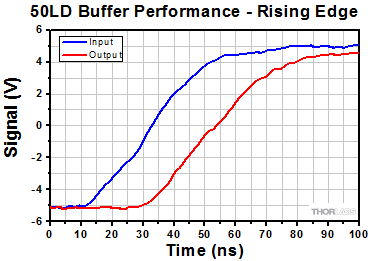
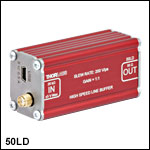
 Zoom
Zoom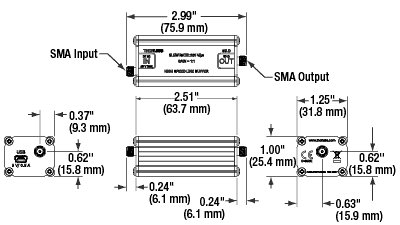
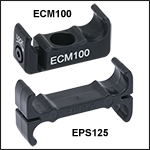
 Active Electrical Voltage Buffer
Active Electrical Voltage Buffer